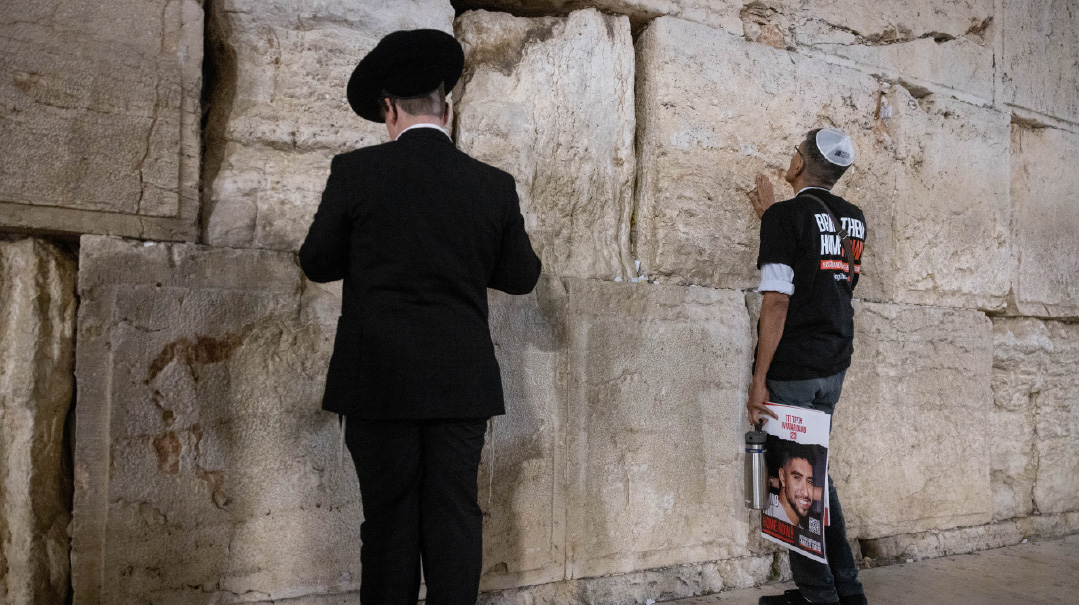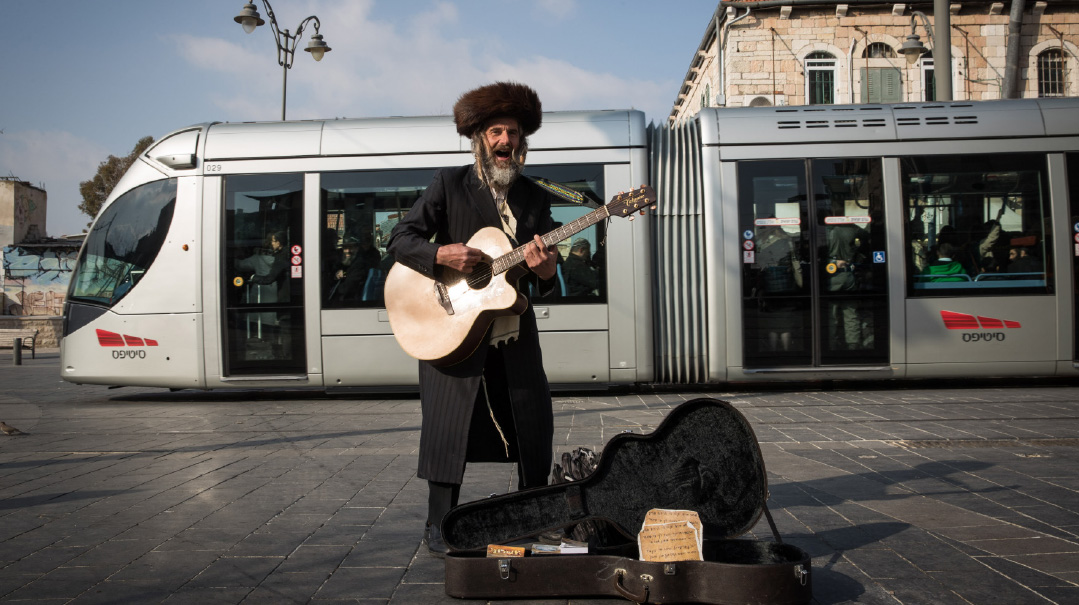Not Behind Closed Doors

Is this what happens when one Jew feels endangered by his brother’s very identity? Is this what the air felt like before the Churban?

Photo: Flash90
AT 8 p.m. last Tuesday night in Israel, Maggie Tabibi, the young and talented anchor of Channel 14’s nightly news broadcast, began her show with a short call for unity in the spirit of the 17th of Tammuz. She featured some live footage of the crowds davening at the Kosel, rued the conflict and strife that have riven Israeli society since October 7th, and concluded with a brief suggestion: “Maybe now is the time to take down the walls [between us], today more than ever.”
Then Tabibi, who is taking strides toward Torah observance, made an unexpected addition. “For the benefit of those in the audience currently completing their fast, I’d like to end my fast together with you,” she said. She proceeded to recite the brachah of shehakol and drink a cup of water — and then got right to her roundup of the day’s top headlines.
If you read Gedalia Guttentag’s feature story this week, you’ll understand why Channel 14’s audience didn’t blink at this unusual opener to their nightly news show. The channel has won a loyal following among Israelis who combine their rightist politics with unabashed belief in the Creator — even if that belief doesn’t translate into full observance.
Step outside the strictly Orthodox neighborhoods of Israel and keep an open eye and ear, and you’ll encounter these people. They’re the women dressed for the beach who pepper their recipe exchanges with liberal pinches of “and with Hashem’s help it will taste delicious.” They’re the tattooed singers who fill crowded amphitheaters with screaming teens — and warble to their appreciative audiences about the Borei Olam. And they’re the gritty laborers who take it as a given that they will fast on the 17th of Tammuz, even if they don’t quite follow the halachic distinctions of terumos and maasros. Last Tuesday Maggie Tabibi tapped that faith in her audience, and they lapped it up along with their post-fast coffees.
But Haaretz columnist Rogel Alper responded differently.
First came the cynicism:
“Apparently Maggie Tabibi was in mourning on the 17th of Tammuz,” he wrote. “To her credit, it must be said that she still managed to gather her strength and show up to present the evening news broadcast on Channel 14. It’s not to be taken for granted. We surely could have expected her to request a few days off to process her great distress about the destruction of two Temples.”
Then came the sermon:
“Observe your religious ceremonies in private, [Maggie]. In Israel or, by the way, in any other venue in the West. We must separate religion from the news industry. The walls of our liberal fortress will never fall to you. You [religious Jews] are an utter churban. This is not ‘Jewish television,’ it’s religious television.”
Alper’s column got the expected response from Channel 14 fans. They duly noted how Haaretz is enlightened enough to regularly rue the plight of Palestinian third-generation refugees, yet still can’t muster any tolerance for a Jew keeping halachah. So much for its supposed liberalism.
But all that stridence, all that passion, over a cup of water — it makes you wonder. Why did Alper blast Tabibi’s primetime brachah in a full-length, blistering condemnation instead of just swiping it away like an annoying gnat? He seems almost… threatened.
What’s he scared of?
Alper’s column may have reminded you of that viral clip of the verbal lashing a secular Israeli woman unleashed upon Yonatan Eilon Hirsch, a 26-year-old chassid riding the city bus in Hod Hasharon last June. First she excoriated him for not serving in the army. When he countered that he was in fact an officer in an elite IDF unit, she yelled, “So why do you wear a kippah? Why do you have that whole shtreimel getup? Are you a cult?”
Before the popularization of the term chiloni to denote a secular lifestyle, Israel’s irreligious Jews described themselves with a different term, chofshi. Like its Yiddish equivalent of frei, it means free — free of observance, unencumbered by the ancient baggage of being different, Other.
When liberty depends on dropping one’s Otherness, then you can more easily understand the vehemence of messages like Alper’s and that woman in Hod Hasharon: Israel is a modern, westernized country where we keep our public sphere “clean.” Keep your religious fanaticism to yourselves, break your fast behind closed doors, mourn your Temples in private and leave us out of it.
The thing these critics tend to forget, though, is that the Jews living in their promised homeland aren’t very good at confining expressions of their identity to behind closed doors. It’s doubtful they keep much of anything behind closed doors.
Spend some time in Israel and you can’t help but notice the blurring of lines between public and private. Laundry lines are strung proudly in full view of passersby. People discuss intimate medical procedures loudly on the train. Strangers on shopping strips offering marriage advice, baby name suggestions, or unsolicited critiques of your parenting style.
For the last year and a half, two warring self-definitions — one the secular “Israeli” and the other a more religious “Jewish” — have battled for supremacy. Complete with billboards and bullhorns, T-shirts and Twitter ads, it’s not a private disagreement.
When you contemplate the tens of thousands who’ve made it a weekly habit to choke the country’s thoroughfares — last year they rallied against judicial reform, this year it’s against a continued military campaign in Gaza — you have to wonder what’s fueling them. Sure, hatred of Bibi is a powerful thing. And in this passionate land where hafganot are almost a national pastime, it’s not unusual for people to spend their precious day off carrying flags and chanting slogans. Still, there seems to be something beyond politics at play. Something more existential.
There’s a refrain that has been around since before the State of Israel’s founding: Ganavtem lanu et hamedinah, you stole our country. You trespassed on the territory we marked as our own and seized the ideological paradise we were creating.
Virtually every demographic has repeated this resentful refrain at some point. The Yemenite elders to the Ashkenazi elites. The German agricultural pioneers to the Russian immigrants. The Socialist kibbutzniks to the Likud voters of the development towns. Left to Right, Right to Left, and if you listen carefully, maybe even the seventh-generation Jerusalemites who see no benefit to a Jewish government in this Land until Mashiach’s arrival.
It’s the type of argument a large, diverse, and outspoken extended family might conduct around their grandparents’ table late into the night — the type of argument US advice columns would provide helpful tips to moderate in those weeks before Thanksgiving.
In these parts, though, the argument isn’t limited to dining room tables. It has overtaken not just the national media, social media, and airwaves, but also the country’s highways and byways, its waiting rooms and virtual spaces.
T
hose who saw a secular, democratic Israel as their ticket to normalcy are despairing for their future. They can no longer pretend that outward shows of religion are a fringe phenomenon limited to the courtyards of Meah Shearim or the windswept outposts of the hilltop youth. No, they are proudly broadcast on highly-rated TV shows and among masses of soldiers adjusting their tzitzis and davening loudly and proudly before they enter Gaza.
Are you surprised, then, when you read Alper’s seething condemnation of a brachah on a cup of water? This isn’t about a cup of water. It’s about an impending earthquake.
You feel the tremors beneath the ground as the protests march onward and the ugly words keep unfurling. You wonder, is this what happens when one Jew feels endangered by his brother’s very identity? Is this what the air felt like before the Churban?
As a feeling Jew, you hope and wish for that day when we can all get along. You daven for shalom, understanding, and reconciliation. But as a religious Jew you have your red lines, too, and you can’t betray your Maker, or your very identity. And so you can’t help but agonize: if my bedrock ideals are the stuff of my neighbor’s nightmares, how can we ever find a way to dream together?
(Originally featured in Mishpacha, Issue 1022)
Oops! We could not locate your form.





